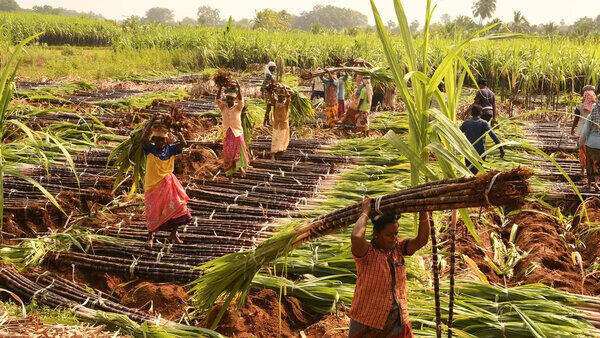Balrampur Chini Mills distillery revenue rises 15% in 5 years

Balrampur Chini Mills, India’s second-largest private sector sugar manufacturer, has seen a 15% rise in revenue contribution from its distillery segment to 26% over the last five financial years. The company’s sugar segment generated 73.28% of revenues, while the distillery segment generated 26.35%. Revenue from the distillery segment grew to ₹1,689 crore in FY24 from ₹566 crore in FY20. The company has invested in non-sugar businesses, including ethanol and co-generated power, to moderate its reliance on sugar. It aims to generate a third of its revenues from ethanol and has diversified into cane-based polylactic acid production.
Generating a growing proportion of its revenues from non-sugar businesses, Balrampur Chini Mills has witnessed around 15 per cent rise in revenue contribution from the distillery segment to over 26 per cent in the last five financial years.
The Kolkata-based company, India’s second largest private sector sugar manufacturer, is also engaged in the business of ethanol and cogenerated power.
“The company’s sugar segment generated 73.28 per cent of revenues and its distillery segment generated 26.35 per cent of revenues during FY23-24,” Balrampur Chini Mills Ltd. (BCML) said in its latest annual report.
During FY20, revenue from the distillery segment had stood at ₹566 crore, contributing around 11 per cent to the company’s total revenue. In the last financial year, revenue from the segment grew to ₹1,689 crore.
BCML’s sugar segment revenue increased to ₹4,697 crore in FY24 from ₹4,423 crore in FY20.
Non-sugar businesses
The company has been making major investment in its non-sugar businesses to broadbase its product mix through enhanced distillery and co-generation revenues in order to moderate an excessive reliance on sugar.
Currently, it has five distillery units with 1,050 kilolitres per day (KLPD) of distillery capacity. This capacity is majorly dedicated to the production of ethanol as the company believes Indian ethanol market is likely to report a larger demand than supply.
The company now possesses one of the largest distillery capacities in the Uttar Pradesh sugar industry.
“We grew our distillery capacity to one of the largest in India within the sugar sector. Short-term policies notwithstanding, our distillery business is poised to transform our revenue mix, moderate short-term debt and enhance profitability,” BCML said in its annual report. During the last financial year, the company enhanced its aggregate distillery capacity from 560 KLPD to 1,050 KLPD.
Notably, during the second half of the last fiscal, the Union government had announced restrictions on the free switchover from sugar manufacture to ethanol production.
“During this period, the company’s stated target of generating a third of its revenues from ethanol may be delayed by a couple of years. Assuming that the government reverses the sector to policy status quo before the next sugar season, we believe that it should translate into a superior financial performance in FY25-26,” Balrampur Chini Mills stated, adding that over the years, the company broad-based its businesses, enhanced scale and moderated debt, which made the business model relatively agnostic to moderate and temporary changes in the sectoral environment.
The company presently has 10 co-generation units with 175.7 MW saleable capacity. It consumed around 54.60 per cent of its co-generated power in FY24 and exported the rest to the Uttar Pradesh state electricity grid and through open access.
‘Diversifying’
In February, the company announced its decision to diversify into the manufacture of cane-based polylactic acid, which is bio-based and can replace single-use plastic and other plastics. “This ₹2,000-crore investment will be the largest in the existence of the company. This development is in line with the company’s long-term direction to moderate its excessive dependence on sugar,” it added.














